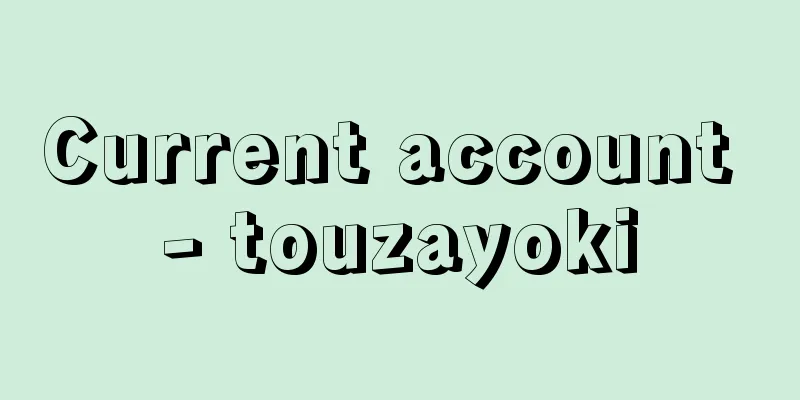Current account - touzayoki

|
A deposit made by a bank's client under a current account contract with the bank for the purpose of entrusting the bank with the payment of checks and bills. It is a type of demand deposit. In Japan, it is interest-free. Depositors can avoid administrative burdens and risks by entrusting the settlement and collection of payments associated with daily business activities to the bank that is their current account client. Current accounts are also said to be typical deposit currencies that function as currency, since current account clients can settle payments by bills and checks using their current account without using cash currency. Current accounts are mostly used as settlement accounts by corporations. In such cases, financial institutions may enter into an "overdraft agreement" that allows the client corporation to settle up to a maximum amount beyond the account balance. Individuals may also use current accounts as dedicated accounts for repayment of installments, credit cards, and loans. A financial institution that allows a client to open an account allows the client to freely use its own bills and checks and circulate them in the financial market, so if the client's checks are frequently dishonored, the financial institution's credit will decline. Therefore, financial institutions will thoroughly investigate and confirm the identity, career, credit status, assets, legal capacity, and past bill and check problems of those applying for current account transactions before deciding whether to accept the transaction. Current account deposits are settlement deposits under the deposit insurance system, so the full amount is protected. [Kazuo Ota] [Reference] | | | |Source: Shogakukan Encyclopedia Nipponica About Encyclopedia Nipponica Information | Legend |
|
銀行の取引先が、小切手・手形の支払いを委託することを目的に銀行との間で締結した当座取引契約に基づき預け入れておく預金で、要求払預金の一種である。日本では無利息である。預金者は、日常の営業活動に伴う支払代金の決済や代金回収を当座預金取引先である銀行に委託して行うことにより、事務負担や危険を回避することができる。また、当座預金者は、現金通貨を用いないで、当座預金口座を使用して、手形・小切手により代金を決済できるため、当座預金は通貨としての機能を有する典型的な預金通貨といわれる。当座預金は、法人による決済口座としての使用がほとんどである。その際、金融機関は、取引先である法人が口座残高を超えて極度額まで決済を認める「当座貸越契約」を締結することがある。なお、個人が当座預金を割賦金やカード・ローンの返済専用口座として使用することもある。口座開設を認めた金融機関は、自らの手形・小切手の自由な使用とその金融市場での流通を認めることになるので、取引先の不渡りが多発すれば、その金融機関の信用は低下する。したがって、金融機関は、当座取引申込み先については、身元、経歴、信用状態、資産、行為能力、過去の手形・小切手事故の有無などについて十分調査確認して取引の諾否を決定する。当座預金は預金保険制度上の決済用預金なので、全額保護される。 [太田和男] [参照項目] | | | |出典 小学館 日本大百科全書(ニッポニカ)日本大百科全書(ニッポニカ)について 情報 | 凡例 |
<<: Bankruptcy - Dad (English spelling) bankruptcy
>>: Insight - insight (English spelling)
Recommend
Onmyouryo - Onmyoryo
An office under the Taiho and Yoro codes. It was ...
qāfila al-mawsim (English spelling) qafilaalmawsim
…The distance traveled by a caravan in a day vari...
Dorcus titanus
…Some males can reach a body length of over 7cm. ...
Unitarian - Yunitterian (English spelling) Unitarian
It refers to a sect that opposes the belief in th...
Petersen, W.
...The magnitude of the current that flows during...
Bycanistes
…Hornbills live in a variety of wooded environmen...
Rainer Maria Rilke
Poet born in Prague, the capital of Bohemia in th...
Shinpei Eto
A politician in the late Edo period and the Meiji...
The strange king
…His pen name was Si Yin. His other name was Qi Z...
indriya
…The Chinese translation of the Sanskrit word ind...
Willow sea eel - Willow sea eel
…Spiny shrimps sometimes live in the grooves that...
Interferometer
A device that uses the interference that occurs w...
Ego psychology
… [Psychoanalysis after Freud] Freud viewed the e...
CIC - Customer Interaction Center
Call centers, which are the core of contact with c...
Enkozume - Enkozume
For example, the custom of Jingi has two meanings...









